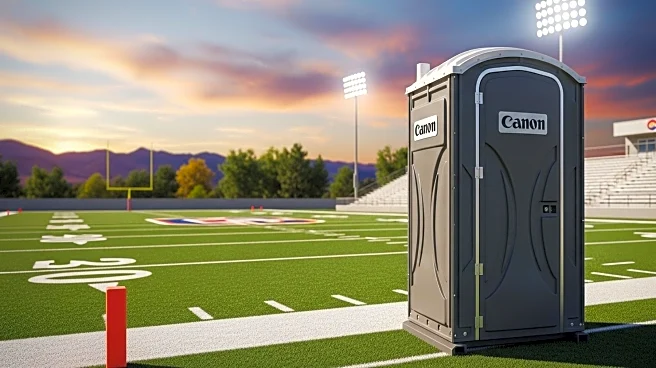What's Happening?
Colorado football coach Deion Sanders has introduced a portable toilet on the sideline during games to manage his health needs following a major surgery. Sanders, who had his cancerous bladder removed in May, now uses a neobladder made from his small intestine, which requires more frequent urination. The portable toilet, sponsored by Depend, is located near the 20-yard line at Folsom Field. Sanders discussed the necessity of this arrangement in an interview with former NFL receiver Michael Irvin, expressing concerns about managing through long quarters without a break. This marks Sanders' third season coaching at Colorado, following a 9-4 finish last year.
Why It's Important?
The introduction of a portable toilet on the sideline highlights the challenges faced by individuals dealing with health issues, particularly in high-pressure environments like sports. Sanders' openness about his condition and the practical steps taken to address it may help reduce stigma around incontinence and bladder issues. This move also underscores the importance of accommodating health needs in professional settings, potentially influencing how sports teams and organizations support their members with similar conditions. Sanders' partnership with Depend further emphasizes the role of corporate sponsorships in addressing personal health challenges.
What's Next?
As the season progresses, Sanders' approach to managing his health condition may prompt discussions within the sports community about the need for similar accommodations for athletes and coaches. The visibility of this issue could lead to broader acceptance and support for individuals facing health challenges. Additionally, Sanders' performance and leadership at Colorado will be closely watched, as he navigates both his personal health and professional responsibilities.
Beyond the Headlines
Sanders' decision to publicly address his health needs and implement practical solutions may inspire others to be more open about their own health challenges. This could lead to increased advocacy for better health accommodations in various sectors, including sports, and encourage more partnerships between health-focused brands and public figures. The cultural impact of Sanders' actions may contribute to a shift in how society views and supports individuals with medical conditions.









